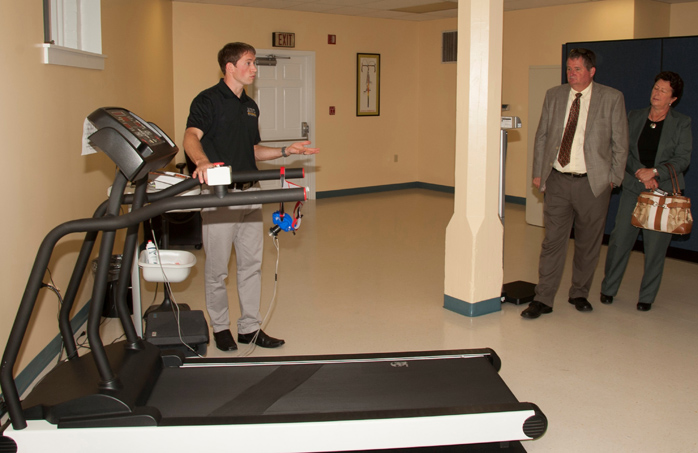Newest Army Wellness Center launched at Carlisle Barracks

The 4th continental U.S. Army Wellness Center officially opened at Carlisle Barracks, Pa., Sept. 14.
It is among the first examples of a health initiative that will help Soldiers and their families take more responsibility for their own health. At Carlisle Barracks, the AWC serves the active-duty, civilian and retiree population surrounding the post and additionally introduces the Army's future leaders attending the Army War College to health promotion and prevention services. In four years, the same core services will be available to most U.S.-based Army beneficiaries.
"Army Wellness Centers offer services that help achieve lifestyle change and prevent chronic diseases like diabetes, heart disease and stroke," explained Todd Hoover, AWC Operations program manager at the U.S. Army Public Health Command. "They empower people to build, sustain and manage their own good health through individualized, ongoing services that help them achieve sustained behavioral change."
AWCs are designed to fill the gap between 10-minute medical appointment counseling and the ongoing support Army beneficiaries need to make lifestyle changes that stick. Wellness center services include metabolic testing, exercise testing and prescription, stress management and biofeedback, tobacco education and referral, general wellness education and weight management. Programs are standardized and based on scientific evidence, Hoover said.
The AWC program is a U.S. Army Medical Command initiative that is managed by the USAPHC. It is a key element in the Army surgeon general's long-term strategy of refocusing Army medicine from a healthcare system to a system for health by emphasizing primary prevention, which means stopping diseases and chronic conditions before they start.
"It is such an accomplishment to open this center which provides the tools to empower this community to prevent disease, improve health and, ultimately, quality of life," said Col. Stephanie Wilcher, commander of the Dunham Army Health Clinic.
"Today, we begin to change the consequence of preventable disease through education and programs that focus on health," said Wilcher. "Pre-diabetes does not have to become diabetes. Obesity does not have to become cardiac disease. We can make a difference and save many the human burden of disease."
Medical treatment facilities like Dunham manage AWCs. Wellness centers are staffed by nurse- and health-educators who document client visits to the centers in the client's medical record. Physicians give direction and oversight, and follow patient progress through the medical record. As more AWCs stand up, the records of Soldiers and their families will follow them as they move from duty station to duty station.
AWCs operate as a partnership among installations, medical treatment facilities and the USAPHC as MEDCOM's program manager for AWCs. That partnership was reflected in the dignitaries and attendees the Carlisle Barracks opening ceremony.
Maj. Gen Richard Stone, the Army deputy surgeon general joined Wilcher; Brig. Gen. Joseph Caravalho, the commander of Northern Regional Medical Command; Col. Bobby Towery, the deputy commandant of the Army War College; John Resta, the USAPHC deputy to the commander for public health; and other leaders and members of the MEDCOM, Army War College, and garrison to officially open the center.
"At the community level, Army Wellness Centers are partnerships with the senior installation commanders, and at the human level, they offer an individualized, holistic approach to health that incorporates body, mind and spirit," said Laura Mitvalsky, the USAPHC's Health Promotion and Wellness Portfolio director. "Together, we are changing the way the Army approaches how we execute health care'moving from a healthcare system to a system of health."
A total 38 wellness centers are planned by the end of fiscal 2017. Currently, in addition to four USAPHC-overseen centers in the continental U.S., seven centers are operating on Army posts in Europe.
(Information for this story was provided by the Army War College Public Affairs Office.)
 An official website of the United States government
An official website of the United States government
 ) or https:// means you've safely connected to the .mil website. Share sensitive information only on official, secure websites.
) or https:// means you've safely connected to the .mil website. Share sensitive information only on official, secure websites.


